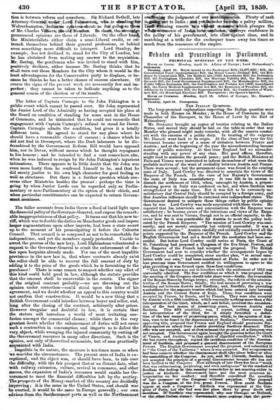The letter of Captain Carnegie to Sir John Pakington, is
a public event which cannot be passed over. Sir John represented the Junior Lord of the Admiralty as having accepted his place at the Board on condition of standing for some seat, in the House of Commons, and he intimated that he could not reconcile that engagement with Captain Carnegie's refusal to stand for Dover. Captain Carnegie admits the condition, but gives it a totally different turn. He agreed to stand, for any plate where he should have a reasonable chance of success ; a chance which he did not find in Dewmport, where the Book labourers to be dis- franohised. by the Government Reform Bill would have opposed him, nor in. Dover, without means which he thought repugnant to his honour ; and he intended to find a seat somewhere else, when he was induced to resign by Sir John Pakington's injurious intimations. There appears to be little doubt that Sir John was even more hasty than he confessed himself to be, and that he did scanty justice to his own high chars cter for good feeling as well as strictness. But there is a further question whirl.. sou- °erne other Ministries besides the present : perhaps the time is going by when Junior Lords can be regarded only as Parlia- mentary or non-Parliamentary at the option of their chiefs, and when particular constituencies can be expected to return Govern- 's/int nominees.


























 Previous page
Previous page